Business Professional Development: Self-Awareness Report - Analysis
VerifiedAdded on 2022/10/11
|13
|3381
|19
Report
AI Summary
This report, focusing on organizational behaviour and professional development, presents a self-awareness analysis based on personality assessments, values, emotional intelligence, leadership, and power dynamics. The student explores their Big Five personality traits, identifying strengths and weaknesses related to openness, conscientiousness, extraversion, agreeableness, and natural reactions. The report further examines personal values and motivators, linking them to emotional intelligence and leadership styles, including the Great Man Theory and transformational leadership. It also discusses the influence of power and politics in the workplace, emphasizing ethical considerations and the impact of actions on others. The student reflects on how these factors contribute to their career goals and overall professional development, offering insights into self-improvement and effective workplace behaviour. The report aims to enhance the student's ability to secure suitable employment and develop their career.
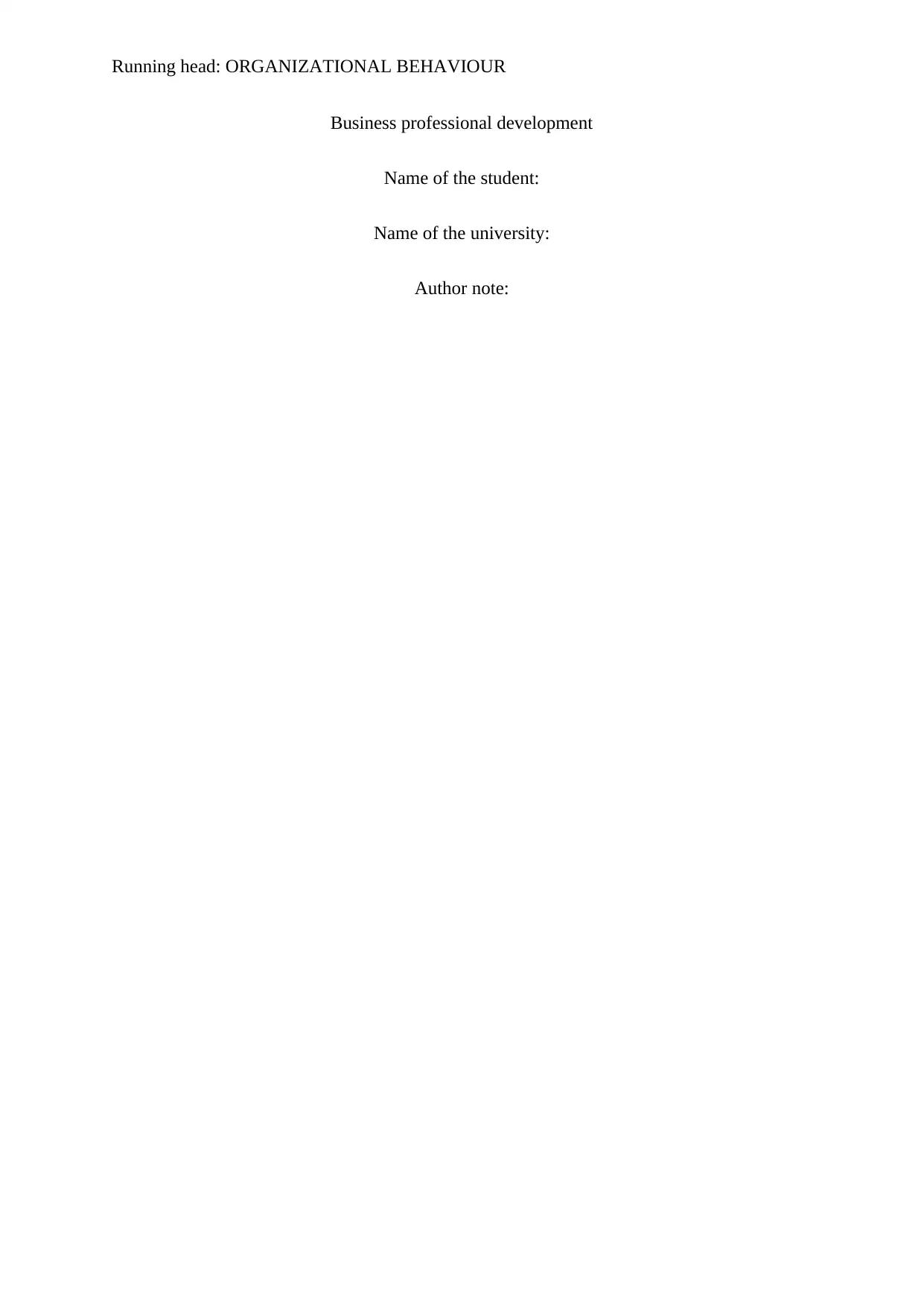
Running head: ORGANIZATIONAL BEHAVIOUR
Business professional development
Name of the student:
Name of the university:
Author note:
Business professional development
Name of the student:
Name of the university:
Author note:
Paraphrase This Document
Need a fresh take? Get an instant paraphrase of this document with our AI Paraphraser
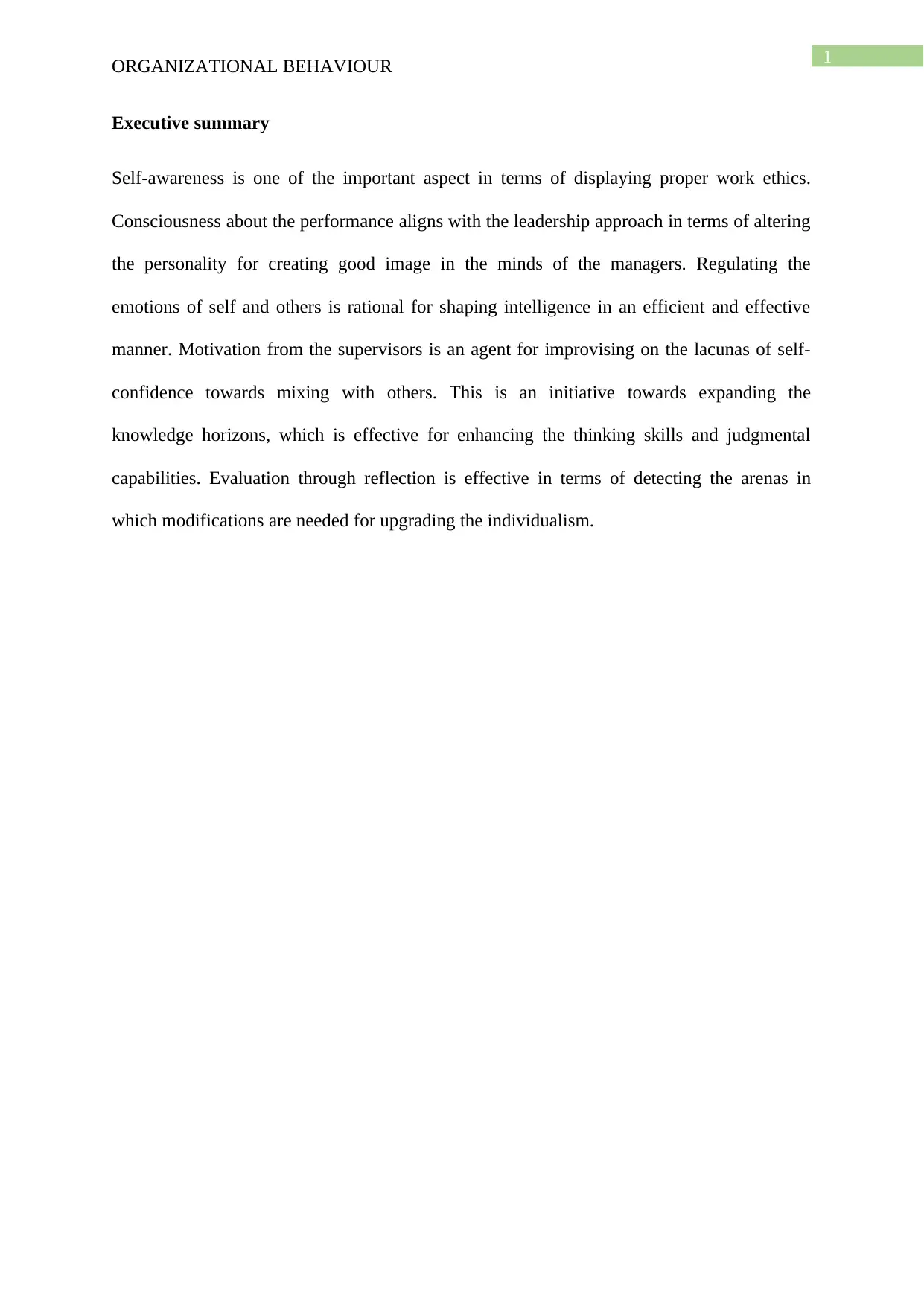
1
ORGANIZATIONAL BEHAVIOUR
Executive summary
Self-awareness is one of the important aspect in terms of displaying proper work ethics.
Consciousness about the performance aligns with the leadership approach in terms of altering
the personality for creating good image in the minds of the managers. Regulating the
emotions of self and others is rational for shaping intelligence in an efficient and effective
manner. Motivation from the supervisors is an agent for improvising on the lacunas of self-
confidence towards mixing with others. This is an initiative towards expanding the
knowledge horizons, which is effective for enhancing the thinking skills and judgmental
capabilities. Evaluation through reflection is effective in terms of detecting the arenas in
which modifications are needed for upgrading the individualism.
ORGANIZATIONAL BEHAVIOUR
Executive summary
Self-awareness is one of the important aspect in terms of displaying proper work ethics.
Consciousness about the performance aligns with the leadership approach in terms of altering
the personality for creating good image in the minds of the managers. Regulating the
emotions of self and others is rational for shaping intelligence in an efficient and effective
manner. Motivation from the supervisors is an agent for improvising on the lacunas of self-
confidence towards mixing with others. This is an initiative towards expanding the
knowledge horizons, which is effective for enhancing the thinking skills and judgmental
capabilities. Evaluation through reflection is effective in terms of detecting the arenas in
which modifications are needed for upgrading the individualism.
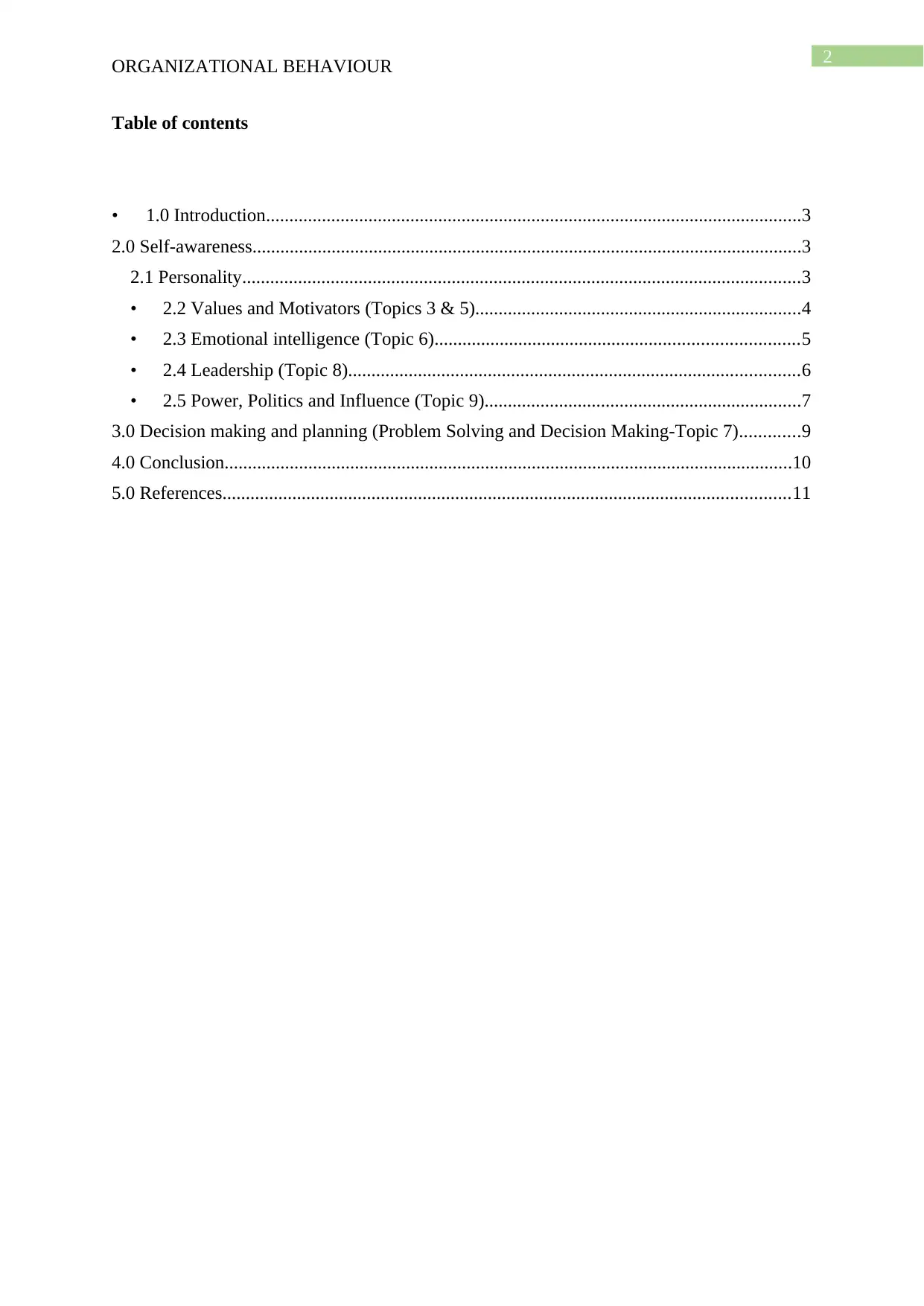
2
ORGANIZATIONAL BEHAVIOUR
Table of contents
• 1.0 Introduction...................................................................................................................3
2.0 Self-awareness......................................................................................................................3
2.1 Personality........................................................................................................................3
• 2.2 Values and Motivators (Topics 3 & 5)......................................................................4
• 2.3 Emotional intelligence (Topic 6)..............................................................................5
• 2.4 Leadership (Topic 8).................................................................................................6
• 2.5 Power, Politics and Influence (Topic 9)....................................................................7
3.0 Decision making and planning (Problem Solving and Decision Making-Topic 7).............9
4.0 Conclusion..........................................................................................................................10
5.0 References..........................................................................................................................11
ORGANIZATIONAL BEHAVIOUR
Table of contents
• 1.0 Introduction...................................................................................................................3
2.0 Self-awareness......................................................................................................................3
2.1 Personality........................................................................................................................3
• 2.2 Values and Motivators (Topics 3 & 5)......................................................................4
• 2.3 Emotional intelligence (Topic 6)..............................................................................5
• 2.4 Leadership (Topic 8).................................................................................................6
• 2.5 Power, Politics and Influence (Topic 9)....................................................................7
3.0 Decision making and planning (Problem Solving and Decision Making-Topic 7).............9
4.0 Conclusion..........................................................................................................................10
5.0 References..........................................................................................................................11
⊘ This is a preview!⊘
Do you want full access?
Subscribe today to unlock all pages.

Trusted by 1+ million students worldwide
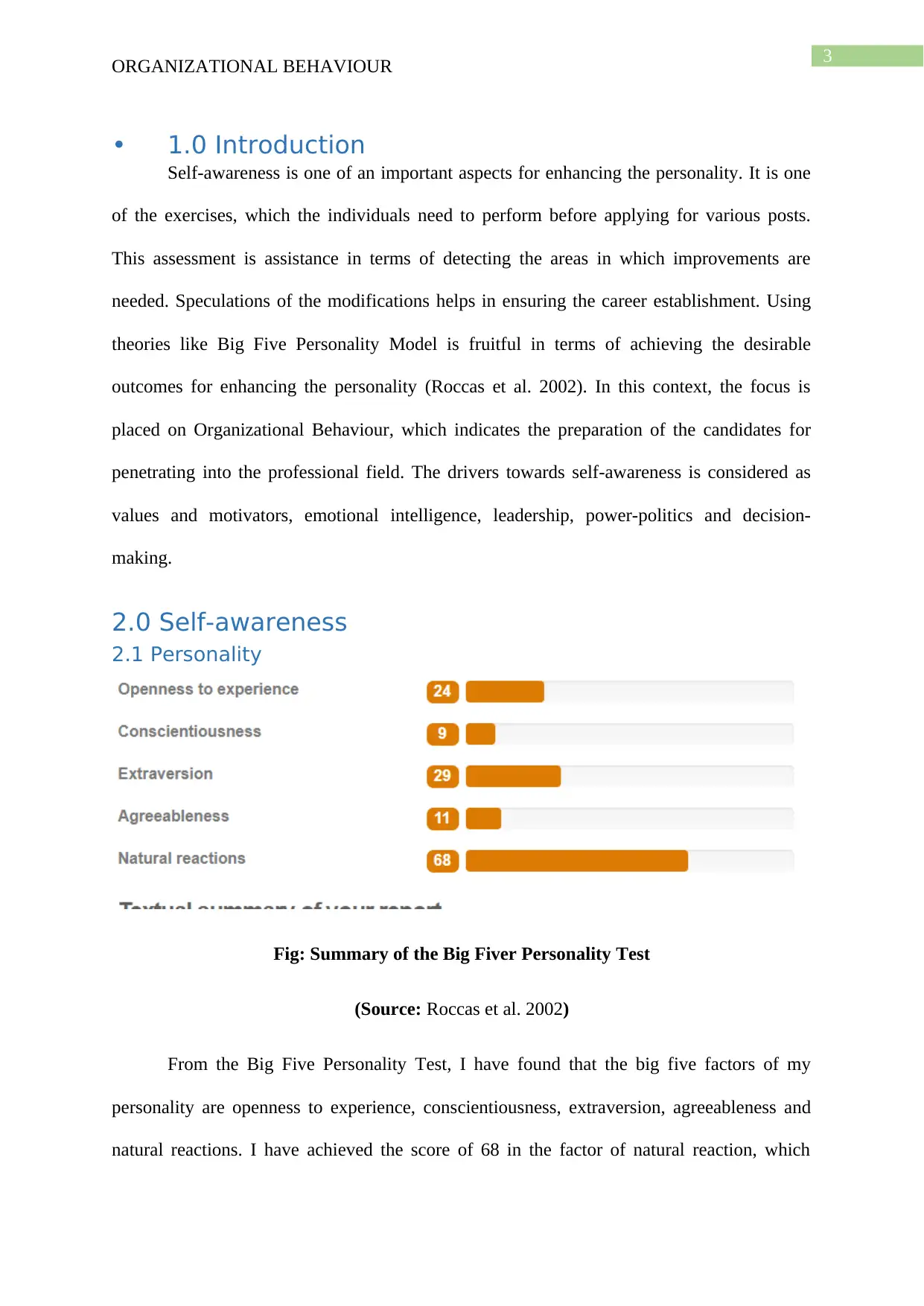
3
ORGANIZATIONAL BEHAVIOUR
• 1.0 Introduction
Self-awareness is one of an important aspects for enhancing the personality. It is one
of the exercises, which the individuals need to perform before applying for various posts.
This assessment is assistance in terms of detecting the areas in which improvements are
needed. Speculations of the modifications helps in ensuring the career establishment. Using
theories like Big Five Personality Model is fruitful in terms of achieving the desirable
outcomes for enhancing the personality (Roccas et al. 2002). In this context, the focus is
placed on Organizational Behaviour, which indicates the preparation of the candidates for
penetrating into the professional field. The drivers towards self-awareness is considered as
values and motivators, emotional intelligence, leadership, power-politics and decision-
making.
2.0 Self-awareness
2.1 Personality
Fig: Summary of the Big Fiver Personality Test
(Source: Roccas et al. 2002)
From the Big Five Personality Test, I have found that the big five factors of my
personality are openness to experience, conscientiousness, extraversion, agreeableness and
natural reactions. I have achieved the score of 68 in the factor of natural reaction, which
ORGANIZATIONAL BEHAVIOUR
• 1.0 Introduction
Self-awareness is one of an important aspects for enhancing the personality. It is one
of the exercises, which the individuals need to perform before applying for various posts.
This assessment is assistance in terms of detecting the areas in which improvements are
needed. Speculations of the modifications helps in ensuring the career establishment. Using
theories like Big Five Personality Model is fruitful in terms of achieving the desirable
outcomes for enhancing the personality (Roccas et al. 2002). In this context, the focus is
placed on Organizational Behaviour, which indicates the preparation of the candidates for
penetrating into the professional field. The drivers towards self-awareness is considered as
values and motivators, emotional intelligence, leadership, power-politics and decision-
making.
2.0 Self-awareness
2.1 Personality
Fig: Summary of the Big Fiver Personality Test
(Source: Roccas et al. 2002)
From the Big Five Personality Test, I have found that the big five factors of my
personality are openness to experience, conscientiousness, extraversion, agreeableness and
natural reactions. I have achieved the score of 68 in the factor of natural reaction, which
Paraphrase This Document
Need a fresh take? Get an instant paraphrase of this document with our AI Paraphraser
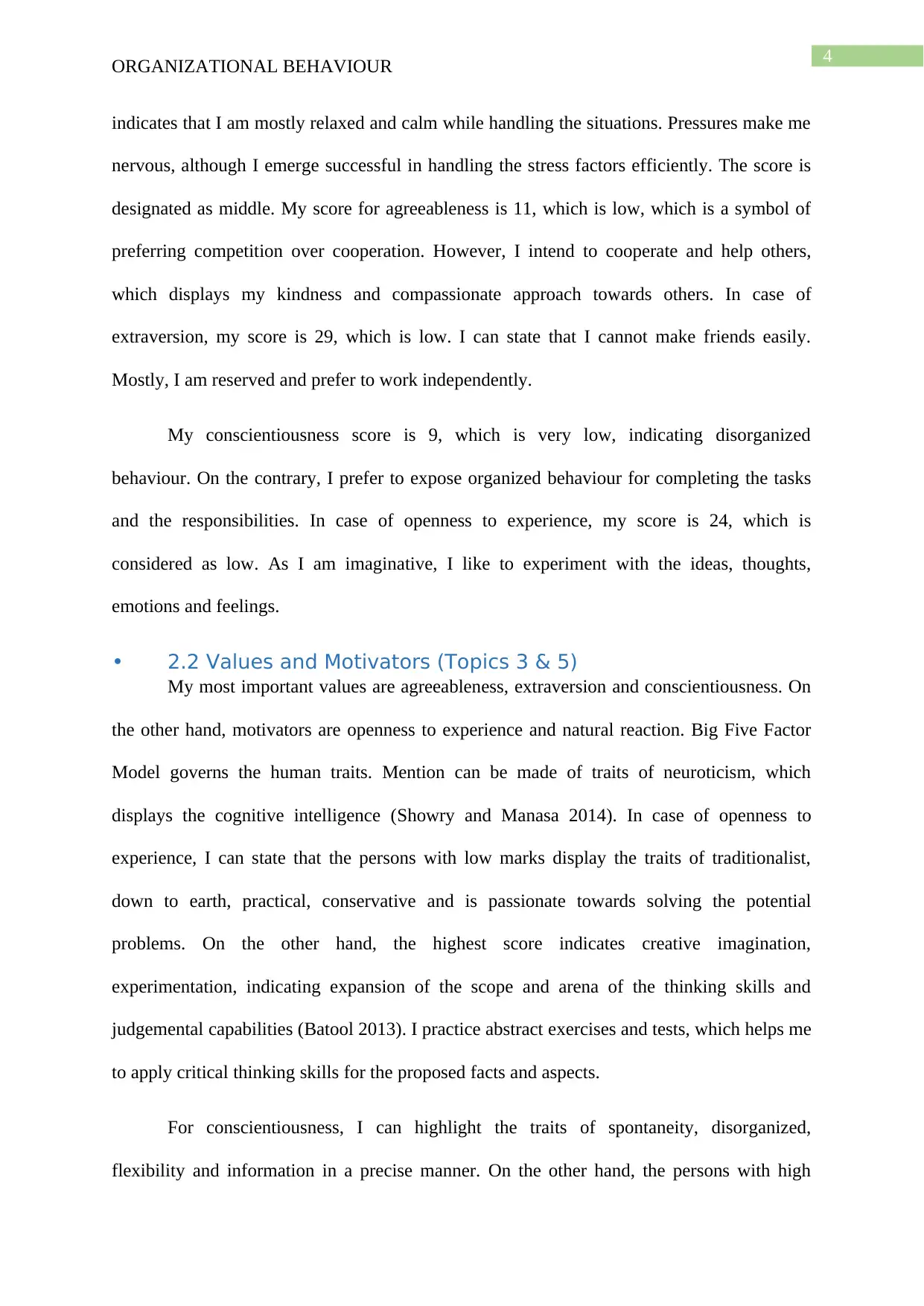
4
ORGANIZATIONAL BEHAVIOUR
indicates that I am mostly relaxed and calm while handling the situations. Pressures make me
nervous, although I emerge successful in handling the stress factors efficiently. The score is
designated as middle. My score for agreeableness is 11, which is low, which is a symbol of
preferring competition over cooperation. However, I intend to cooperate and help others,
which displays my kindness and compassionate approach towards others. In case of
extraversion, my score is 29, which is low. I can state that I cannot make friends easily.
Mostly, I am reserved and prefer to work independently.
My conscientiousness score is 9, which is very low, indicating disorganized
behaviour. On the contrary, I prefer to expose organized behaviour for completing the tasks
and the responsibilities. In case of openness to experience, my score is 24, which is
considered as low. As I am imaginative, I like to experiment with the ideas, thoughts,
emotions and feelings.
• 2.2 Values and Motivators (Topics 3 & 5)
My most important values are agreeableness, extraversion and conscientiousness. On
the other hand, motivators are openness to experience and natural reaction. Big Five Factor
Model governs the human traits. Mention can be made of traits of neuroticism, which
displays the cognitive intelligence (Showry and Manasa 2014). In case of openness to
experience, I can state that the persons with low marks display the traits of traditionalist,
down to earth, practical, conservative and is passionate towards solving the potential
problems. On the other hand, the highest score indicates creative imagination,
experimentation, indicating expansion of the scope and arena of the thinking skills and
judgemental capabilities (Batool 2013). I practice abstract exercises and tests, which helps me
to apply critical thinking skills for the proposed facts and aspects.
For conscientiousness, I can highlight the traits of spontaneity, disorganized,
flexibility and information in a precise manner. On the other hand, the persons with high
ORGANIZATIONAL BEHAVIOUR
indicates that I am mostly relaxed and calm while handling the situations. Pressures make me
nervous, although I emerge successful in handling the stress factors efficiently. The score is
designated as middle. My score for agreeableness is 11, which is low, which is a symbol of
preferring competition over cooperation. However, I intend to cooperate and help others,
which displays my kindness and compassionate approach towards others. In case of
extraversion, my score is 29, which is low. I can state that I cannot make friends easily.
Mostly, I am reserved and prefer to work independently.
My conscientiousness score is 9, which is very low, indicating disorganized
behaviour. On the contrary, I prefer to expose organized behaviour for completing the tasks
and the responsibilities. In case of openness to experience, my score is 24, which is
considered as low. As I am imaginative, I like to experiment with the ideas, thoughts,
emotions and feelings.
• 2.2 Values and Motivators (Topics 3 & 5)
My most important values are agreeableness, extraversion and conscientiousness. On
the other hand, motivators are openness to experience and natural reaction. Big Five Factor
Model governs the human traits. Mention can be made of traits of neuroticism, which
displays the cognitive intelligence (Showry and Manasa 2014). In case of openness to
experience, I can state that the persons with low marks display the traits of traditionalist,
down to earth, practical, conservative and is passionate towards solving the potential
problems. On the other hand, the highest score indicates creative imagination,
experimentation, indicating expansion of the scope and arena of the thinking skills and
judgemental capabilities (Batool 2013). I practice abstract exercises and tests, which helps me
to apply critical thinking skills for the proposed facts and aspects.
For conscientiousness, I can highlight the traits of spontaneity, disorganized,
flexibility and information in a precise manner. On the other hand, the persons with high
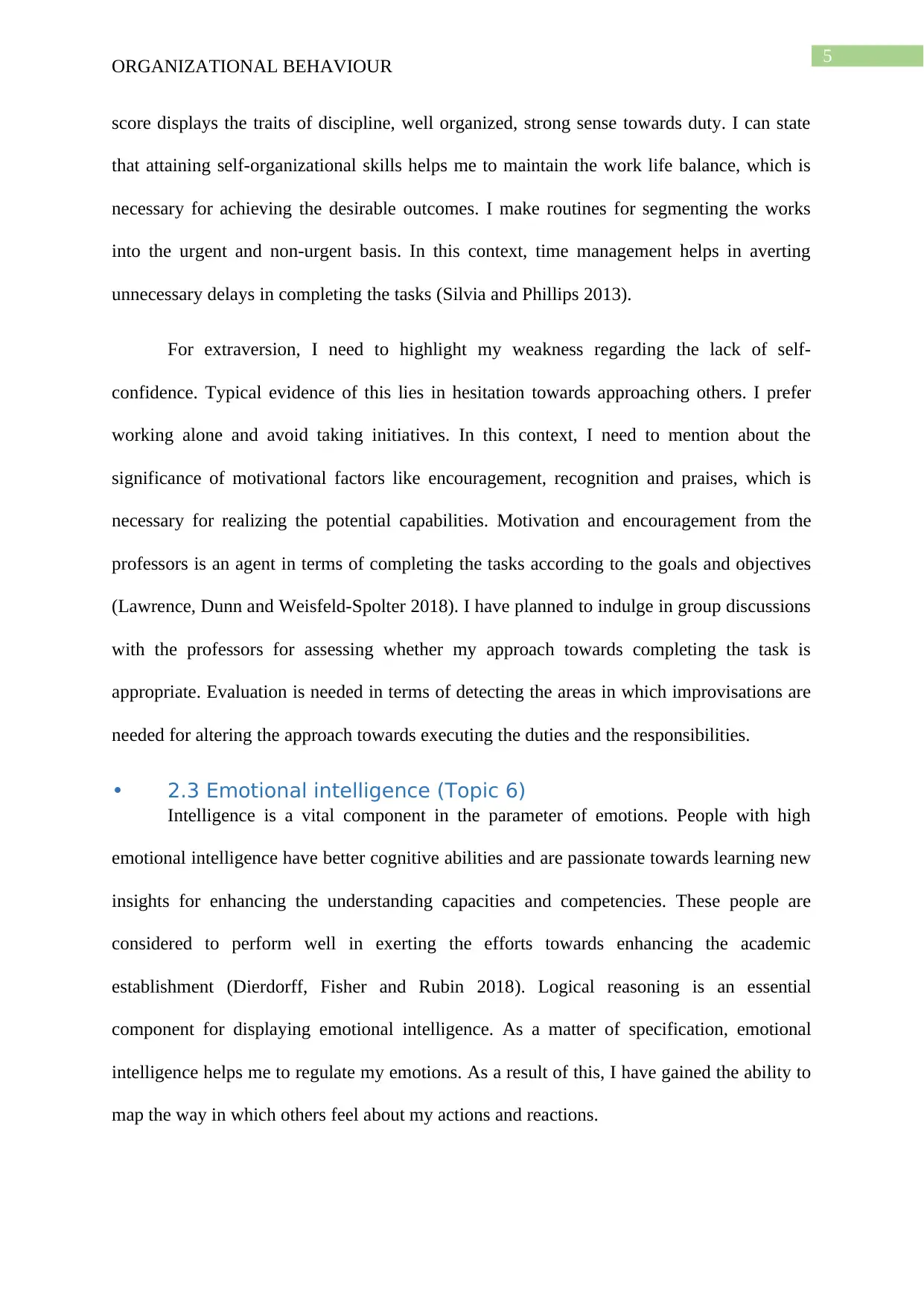
5
ORGANIZATIONAL BEHAVIOUR
score displays the traits of discipline, well organized, strong sense towards duty. I can state
that attaining self-organizational skills helps me to maintain the work life balance, which is
necessary for achieving the desirable outcomes. I make routines for segmenting the works
into the urgent and non-urgent basis. In this context, time management helps in averting
unnecessary delays in completing the tasks (Silvia and Phillips 2013).
For extraversion, I need to highlight my weakness regarding the lack of self-
confidence. Typical evidence of this lies in hesitation towards approaching others. I prefer
working alone and avoid taking initiatives. In this context, I need to mention about the
significance of motivational factors like encouragement, recognition and praises, which is
necessary for realizing the potential capabilities. Motivation and encouragement from the
professors is an agent in terms of completing the tasks according to the goals and objectives
(Lawrence, Dunn and Weisfeld-Spolter 2018). I have planned to indulge in group discussions
with the professors for assessing whether my approach towards completing the task is
appropriate. Evaluation is needed in terms of detecting the areas in which improvisations are
needed for altering the approach towards executing the duties and the responsibilities.
• 2.3 Emotional intelligence (Topic 6)
Intelligence is a vital component in the parameter of emotions. People with high
emotional intelligence have better cognitive abilities and are passionate towards learning new
insights for enhancing the understanding capacities and competencies. These people are
considered to perform well in exerting the efforts towards enhancing the academic
establishment (Dierdorff, Fisher and Rubin 2018). Logical reasoning is an essential
component for displaying emotional intelligence. As a matter of specification, emotional
intelligence helps me to regulate my emotions. As a result of this, I have gained the ability to
map the way in which others feel about my actions and reactions.
ORGANIZATIONAL BEHAVIOUR
score displays the traits of discipline, well organized, strong sense towards duty. I can state
that attaining self-organizational skills helps me to maintain the work life balance, which is
necessary for achieving the desirable outcomes. I make routines for segmenting the works
into the urgent and non-urgent basis. In this context, time management helps in averting
unnecessary delays in completing the tasks (Silvia and Phillips 2013).
For extraversion, I need to highlight my weakness regarding the lack of self-
confidence. Typical evidence of this lies in hesitation towards approaching others. I prefer
working alone and avoid taking initiatives. In this context, I need to mention about the
significance of motivational factors like encouragement, recognition and praises, which is
necessary for realizing the potential capabilities. Motivation and encouragement from the
professors is an agent in terms of completing the tasks according to the goals and objectives
(Lawrence, Dunn and Weisfeld-Spolter 2018). I have planned to indulge in group discussions
with the professors for assessing whether my approach towards completing the task is
appropriate. Evaluation is needed in terms of detecting the areas in which improvisations are
needed for altering the approach towards executing the duties and the responsibilities.
• 2.3 Emotional intelligence (Topic 6)
Intelligence is a vital component in the parameter of emotions. People with high
emotional intelligence have better cognitive abilities and are passionate towards learning new
insights for enhancing the understanding capacities and competencies. These people are
considered to perform well in exerting the efforts towards enhancing the academic
establishment (Dierdorff, Fisher and Rubin 2018). Logical reasoning is an essential
component for displaying emotional intelligence. As a matter of specification, emotional
intelligence helps me to regulate my emotions. As a result of this, I have gained the ability to
map the way in which others feel about my actions and reactions.
⊘ This is a preview!⊘
Do you want full access?
Subscribe today to unlock all pages.

Trusted by 1+ million students worldwide
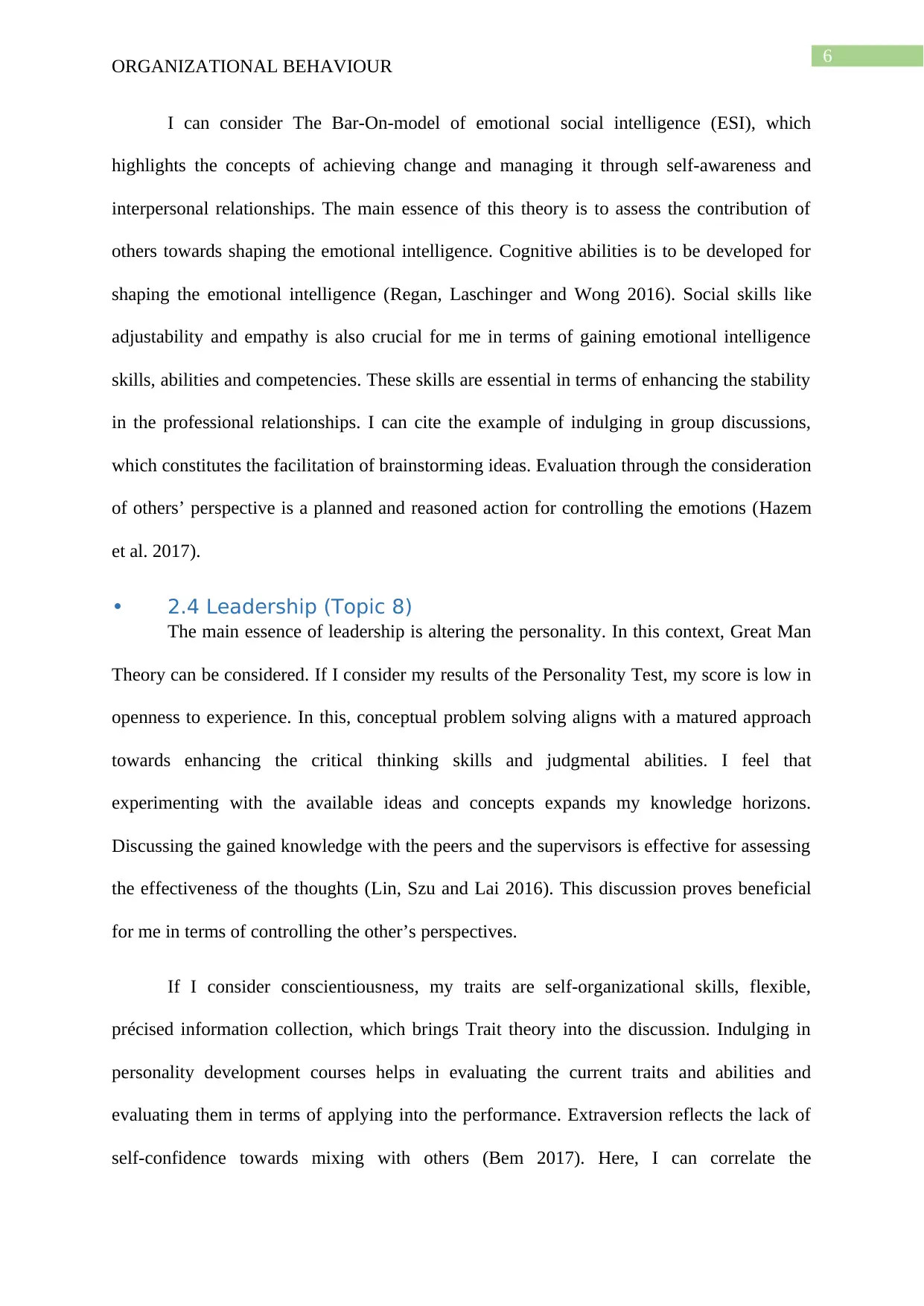
6
ORGANIZATIONAL BEHAVIOUR
I can consider The Bar-On-model of emotional social intelligence (ESI), which
highlights the concepts of achieving change and managing it through self-awareness and
interpersonal relationships. The main essence of this theory is to assess the contribution of
others towards shaping the emotional intelligence. Cognitive abilities is to be developed for
shaping the emotional intelligence (Regan, Laschinger and Wong 2016). Social skills like
adjustability and empathy is also crucial for me in terms of gaining emotional intelligence
skills, abilities and competencies. These skills are essential in terms of enhancing the stability
in the professional relationships. I can cite the example of indulging in group discussions,
which constitutes the facilitation of brainstorming ideas. Evaluation through the consideration
of others’ perspective is a planned and reasoned action for controlling the emotions (Hazem
et al. 2017).
• 2.4 Leadership (Topic 8)
The main essence of leadership is altering the personality. In this context, Great Man
Theory can be considered. If I consider my results of the Personality Test, my score is low in
openness to experience. In this, conceptual problem solving aligns with a matured approach
towards enhancing the critical thinking skills and judgmental abilities. I feel that
experimenting with the available ideas and concepts expands my knowledge horizons.
Discussing the gained knowledge with the peers and the supervisors is effective for assessing
the effectiveness of the thoughts (Lin, Szu and Lai 2016). This discussion proves beneficial
for me in terms of controlling the other’s perspectives.
If I consider conscientiousness, my traits are self-organizational skills, flexible,
précised information collection, which brings Trait theory into the discussion. Indulging in
personality development courses helps in evaluating the current traits and abilities and
evaluating them in terms of applying into the performance. Extraversion reflects the lack of
self-confidence towards mixing with others (Bem 2017). Here, I can correlate the
ORGANIZATIONAL BEHAVIOUR
I can consider The Bar-On-model of emotional social intelligence (ESI), which
highlights the concepts of achieving change and managing it through self-awareness and
interpersonal relationships. The main essence of this theory is to assess the contribution of
others towards shaping the emotional intelligence. Cognitive abilities is to be developed for
shaping the emotional intelligence (Regan, Laschinger and Wong 2016). Social skills like
adjustability and empathy is also crucial for me in terms of gaining emotional intelligence
skills, abilities and competencies. These skills are essential in terms of enhancing the stability
in the professional relationships. I can cite the example of indulging in group discussions,
which constitutes the facilitation of brainstorming ideas. Evaluation through the consideration
of others’ perspective is a planned and reasoned action for controlling the emotions (Hazem
et al. 2017).
• 2.4 Leadership (Topic 8)
The main essence of leadership is altering the personality. In this context, Great Man
Theory can be considered. If I consider my results of the Personality Test, my score is low in
openness to experience. In this, conceptual problem solving aligns with a matured approach
towards enhancing the critical thinking skills and judgmental abilities. I feel that
experimenting with the available ideas and concepts expands my knowledge horizons.
Discussing the gained knowledge with the peers and the supervisors is effective for assessing
the effectiveness of the thoughts (Lin, Szu and Lai 2016). This discussion proves beneficial
for me in terms of controlling the other’s perspectives.
If I consider conscientiousness, my traits are self-organizational skills, flexible,
précised information collection, which brings Trait theory into the discussion. Indulging in
personality development courses helps in evaluating the current traits and abilities and
evaluating them in terms of applying into the performance. Extraversion reflects the lack of
self-confidence towards mixing with others (Bem 2017). Here, I can correlate the
Paraphrase This Document
Need a fresh take? Get an instant paraphrase of this document with our AI Paraphraser
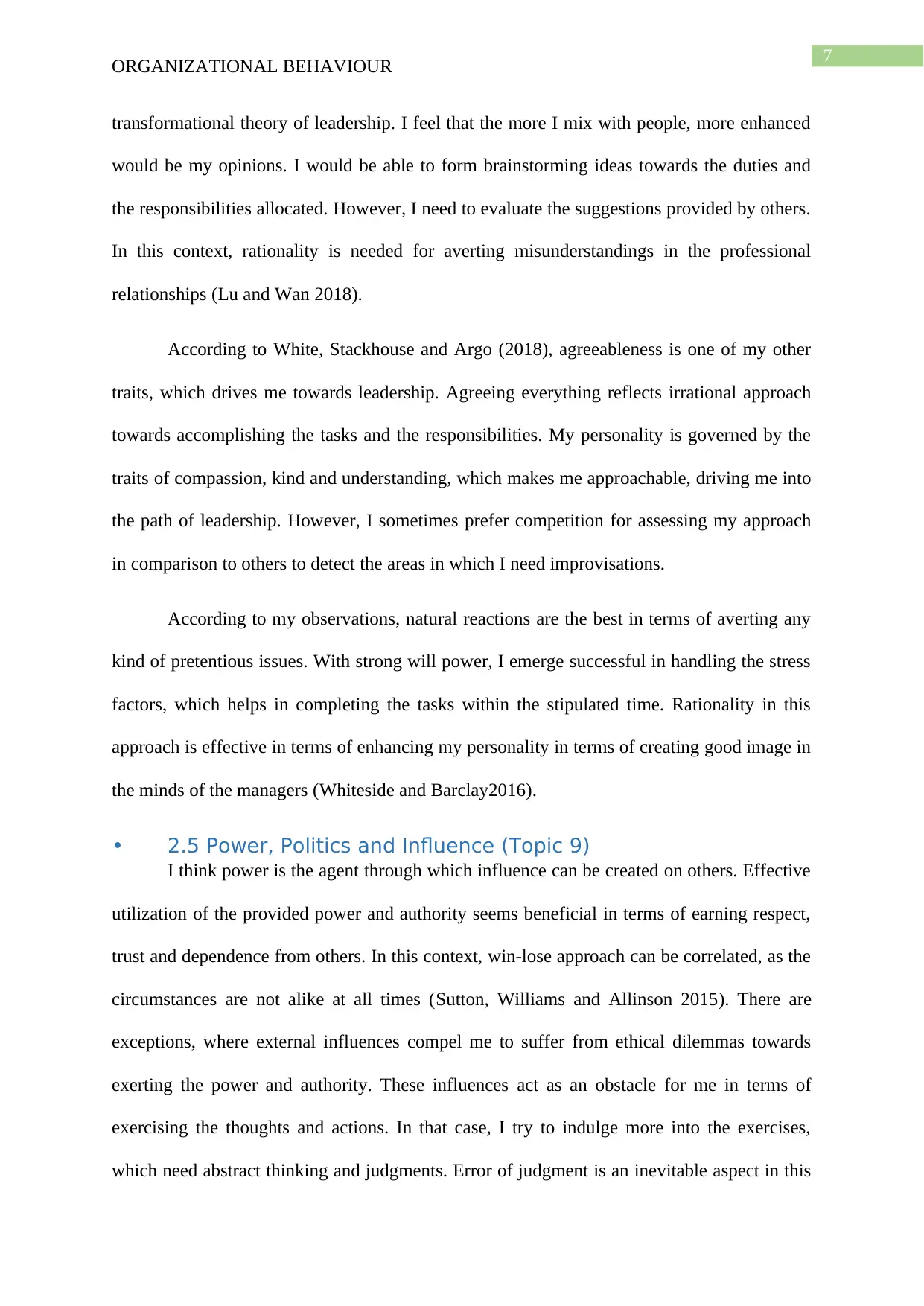
7
ORGANIZATIONAL BEHAVIOUR
transformational theory of leadership. I feel that the more I mix with people, more enhanced
would be my opinions. I would be able to form brainstorming ideas towards the duties and
the responsibilities allocated. However, I need to evaluate the suggestions provided by others.
In this context, rationality is needed for averting misunderstandings in the professional
relationships (Lu and Wan 2018).
According to White, Stackhouse and Argo (2018), agreeableness is one of my other
traits, which drives me towards leadership. Agreeing everything reflects irrational approach
towards accomplishing the tasks and the responsibilities. My personality is governed by the
traits of compassion, kind and understanding, which makes me approachable, driving me into
the path of leadership. However, I sometimes prefer competition for assessing my approach
in comparison to others to detect the areas in which I need improvisations.
According to my observations, natural reactions are the best in terms of averting any
kind of pretentious issues. With strong will power, I emerge successful in handling the stress
factors, which helps in completing the tasks within the stipulated time. Rationality in this
approach is effective in terms of enhancing my personality in terms of creating good image in
the minds of the managers (Whiteside and Barclay2016).
• 2.5 Power, Politics and Influence (Topic 9)
I think power is the agent through which influence can be created on others. Effective
utilization of the provided power and authority seems beneficial in terms of earning respect,
trust and dependence from others. In this context, win-lose approach can be correlated, as the
circumstances are not alike at all times (Sutton, Williams and Allinson 2015). There are
exceptions, where external influences compel me to suffer from ethical dilemmas towards
exerting the power and authority. These influences act as an obstacle for me in terms of
exercising the thoughts and actions. In that case, I try to indulge more into the exercises,
which need abstract thinking and judgments. Error of judgment is an inevitable aspect in this
ORGANIZATIONAL BEHAVIOUR
transformational theory of leadership. I feel that the more I mix with people, more enhanced
would be my opinions. I would be able to form brainstorming ideas towards the duties and
the responsibilities allocated. However, I need to evaluate the suggestions provided by others.
In this context, rationality is needed for averting misunderstandings in the professional
relationships (Lu and Wan 2018).
According to White, Stackhouse and Argo (2018), agreeableness is one of my other
traits, which drives me towards leadership. Agreeing everything reflects irrational approach
towards accomplishing the tasks and the responsibilities. My personality is governed by the
traits of compassion, kind and understanding, which makes me approachable, driving me into
the path of leadership. However, I sometimes prefer competition for assessing my approach
in comparison to others to detect the areas in which I need improvisations.
According to my observations, natural reactions are the best in terms of averting any
kind of pretentious issues. With strong will power, I emerge successful in handling the stress
factors, which helps in completing the tasks within the stipulated time. Rationality in this
approach is effective in terms of enhancing my personality in terms of creating good image in
the minds of the managers (Whiteside and Barclay2016).
• 2.5 Power, Politics and Influence (Topic 9)
I think power is the agent through which influence can be created on others. Effective
utilization of the provided power and authority seems beneficial in terms of earning respect,
trust and dependence from others. In this context, win-lose approach can be correlated, as the
circumstances are not alike at all times (Sutton, Williams and Allinson 2015). There are
exceptions, where external influences compel me to suffer from ethical dilemmas towards
exerting the power and authority. These influences act as an obstacle for me in terms of
exercising the thoughts and actions. In that case, I try to indulge more into the exercises,
which need abstract thinking and judgments. Error of judgment is an inevitable aspect in this
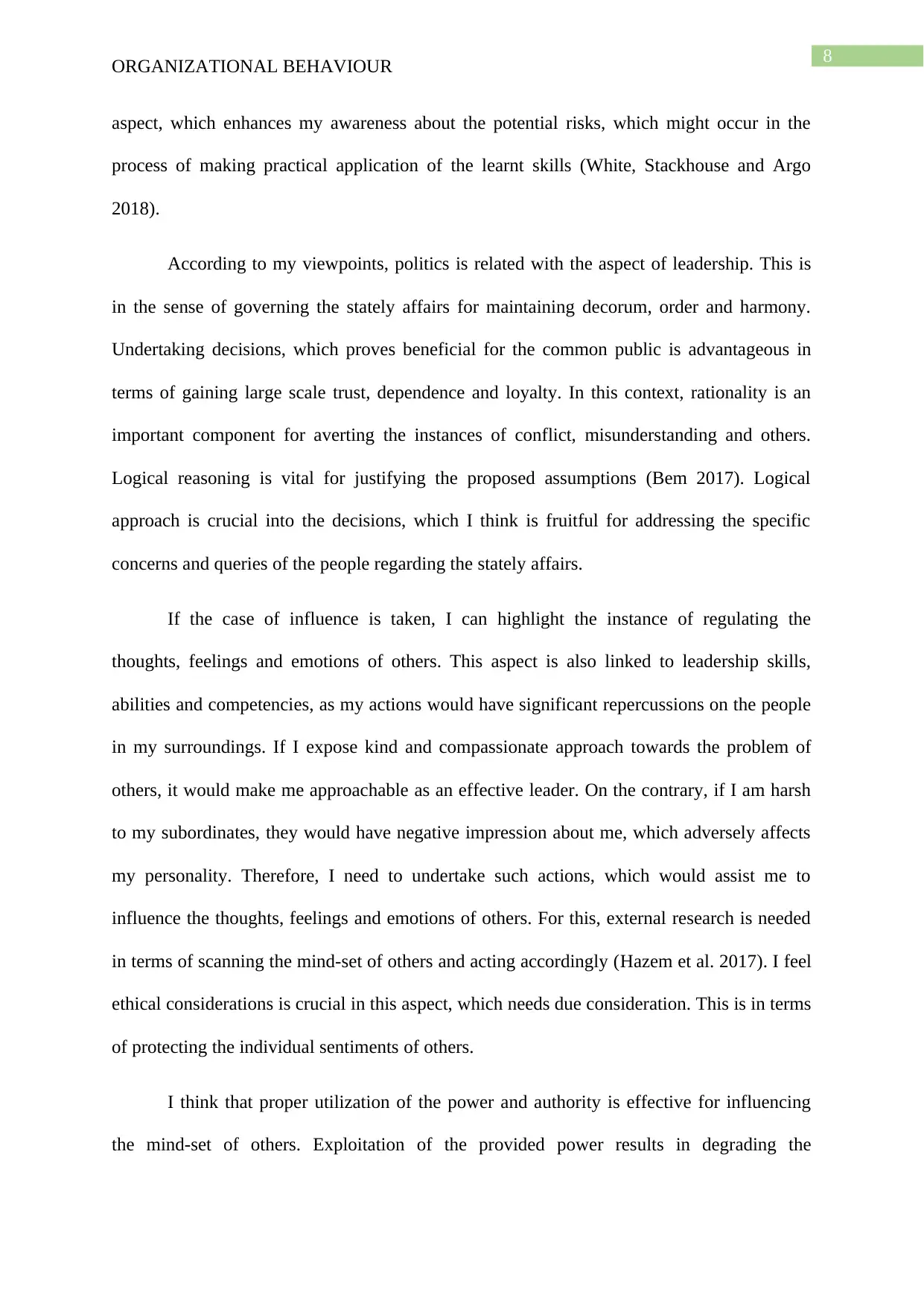
8
ORGANIZATIONAL BEHAVIOUR
aspect, which enhances my awareness about the potential risks, which might occur in the
process of making practical application of the learnt skills (White, Stackhouse and Argo
2018).
According to my viewpoints, politics is related with the aspect of leadership. This is
in the sense of governing the stately affairs for maintaining decorum, order and harmony.
Undertaking decisions, which proves beneficial for the common public is advantageous in
terms of gaining large scale trust, dependence and loyalty. In this context, rationality is an
important component for averting the instances of conflict, misunderstanding and others.
Logical reasoning is vital for justifying the proposed assumptions (Bem 2017). Logical
approach is crucial into the decisions, which I think is fruitful for addressing the specific
concerns and queries of the people regarding the stately affairs.
If the case of influence is taken, I can highlight the instance of regulating the
thoughts, feelings and emotions of others. This aspect is also linked to leadership skills,
abilities and competencies, as my actions would have significant repercussions on the people
in my surroundings. If I expose kind and compassionate approach towards the problem of
others, it would make me approachable as an effective leader. On the contrary, if I am harsh
to my subordinates, they would have negative impression about me, which adversely affects
my personality. Therefore, I need to undertake such actions, which would assist me to
influence the thoughts, feelings and emotions of others. For this, external research is needed
in terms of scanning the mind-set of others and acting accordingly (Hazem et al. 2017). I feel
ethical considerations is crucial in this aspect, which needs due consideration. This is in terms
of protecting the individual sentiments of others.
I think that proper utilization of the power and authority is effective for influencing
the mind-set of others. Exploitation of the provided power results in degrading the
ORGANIZATIONAL BEHAVIOUR
aspect, which enhances my awareness about the potential risks, which might occur in the
process of making practical application of the learnt skills (White, Stackhouse and Argo
2018).
According to my viewpoints, politics is related with the aspect of leadership. This is
in the sense of governing the stately affairs for maintaining decorum, order and harmony.
Undertaking decisions, which proves beneficial for the common public is advantageous in
terms of gaining large scale trust, dependence and loyalty. In this context, rationality is an
important component for averting the instances of conflict, misunderstanding and others.
Logical reasoning is vital for justifying the proposed assumptions (Bem 2017). Logical
approach is crucial into the decisions, which I think is fruitful for addressing the specific
concerns and queries of the people regarding the stately affairs.
If the case of influence is taken, I can highlight the instance of regulating the
thoughts, feelings and emotions of others. This aspect is also linked to leadership skills,
abilities and competencies, as my actions would have significant repercussions on the people
in my surroundings. If I expose kind and compassionate approach towards the problem of
others, it would make me approachable as an effective leader. On the contrary, if I am harsh
to my subordinates, they would have negative impression about me, which adversely affects
my personality. Therefore, I need to undertake such actions, which would assist me to
influence the thoughts, feelings and emotions of others. For this, external research is needed
in terms of scanning the mind-set of others and acting accordingly (Hazem et al. 2017). I feel
ethical considerations is crucial in this aspect, which needs due consideration. This is in terms
of protecting the individual sentiments of others.
I think that proper utilization of the power and authority is effective for influencing
the mind-set of others. Exploitation of the provided power results in degrading the
⊘ This is a preview!⊘
Do you want full access?
Subscribe today to unlock all pages.

Trusted by 1+ million students worldwide
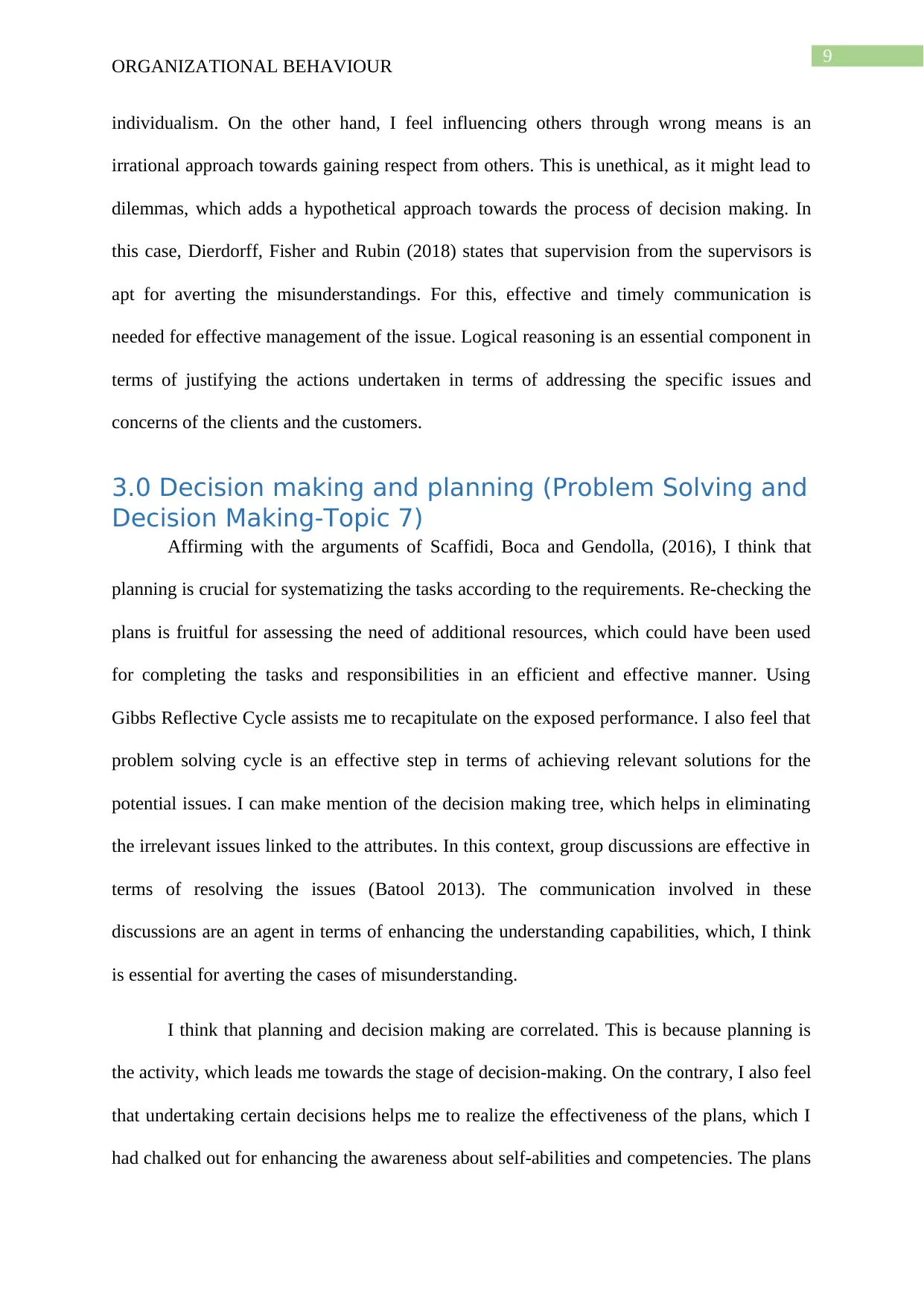
9
ORGANIZATIONAL BEHAVIOUR
individualism. On the other hand, I feel influencing others through wrong means is an
irrational approach towards gaining respect from others. This is unethical, as it might lead to
dilemmas, which adds a hypothetical approach towards the process of decision making. In
this case, Dierdorff, Fisher and Rubin (2018) states that supervision from the supervisors is
apt for averting the misunderstandings. For this, effective and timely communication is
needed for effective management of the issue. Logical reasoning is an essential component in
terms of justifying the actions undertaken in terms of addressing the specific issues and
concerns of the clients and the customers.
3.0 Decision making and planning (Problem Solving and
Decision Making-Topic 7)
Affirming with the arguments of Scaffidi, Boca and Gendolla, (2016), I think that
planning is crucial for systematizing the tasks according to the requirements. Re-checking the
plans is fruitful for assessing the need of additional resources, which could have been used
for completing the tasks and responsibilities in an efficient and effective manner. Using
Gibbs Reflective Cycle assists me to recapitulate on the exposed performance. I also feel that
problem solving cycle is an effective step in terms of achieving relevant solutions for the
potential issues. I can make mention of the decision making tree, which helps in eliminating
the irrelevant issues linked to the attributes. In this context, group discussions are effective in
terms of resolving the issues (Batool 2013). The communication involved in these
discussions are an agent in terms of enhancing the understanding capabilities, which, I think
is essential for averting the cases of misunderstanding.
I think that planning and decision making are correlated. This is because planning is
the activity, which leads me towards the stage of decision-making. On the contrary, I also feel
that undertaking certain decisions helps me to realize the effectiveness of the plans, which I
had chalked out for enhancing the awareness about self-abilities and competencies. The plans
ORGANIZATIONAL BEHAVIOUR
individualism. On the other hand, I feel influencing others through wrong means is an
irrational approach towards gaining respect from others. This is unethical, as it might lead to
dilemmas, which adds a hypothetical approach towards the process of decision making. In
this case, Dierdorff, Fisher and Rubin (2018) states that supervision from the supervisors is
apt for averting the misunderstandings. For this, effective and timely communication is
needed for effective management of the issue. Logical reasoning is an essential component in
terms of justifying the actions undertaken in terms of addressing the specific issues and
concerns of the clients and the customers.
3.0 Decision making and planning (Problem Solving and
Decision Making-Topic 7)
Affirming with the arguments of Scaffidi, Boca and Gendolla, (2016), I think that
planning is crucial for systematizing the tasks according to the requirements. Re-checking the
plans is fruitful for assessing the need of additional resources, which could have been used
for completing the tasks and responsibilities in an efficient and effective manner. Using
Gibbs Reflective Cycle assists me to recapitulate on the exposed performance. I also feel that
problem solving cycle is an effective step in terms of achieving relevant solutions for the
potential issues. I can make mention of the decision making tree, which helps in eliminating
the irrelevant issues linked to the attributes. In this context, group discussions are effective in
terms of resolving the issues (Batool 2013). The communication involved in these
discussions are an agent in terms of enhancing the understanding capabilities, which, I think
is essential for averting the cases of misunderstanding.
I think that planning and decision making are correlated. This is because planning is
the activity, which leads me towards the stage of decision-making. On the contrary, I also feel
that undertaking certain decisions helps me to realize the effectiveness of the plans, which I
had chalked out for enhancing the awareness about self-abilities and competencies. The plans
Paraphrase This Document
Need a fresh take? Get an instant paraphrase of this document with our AI Paraphraser
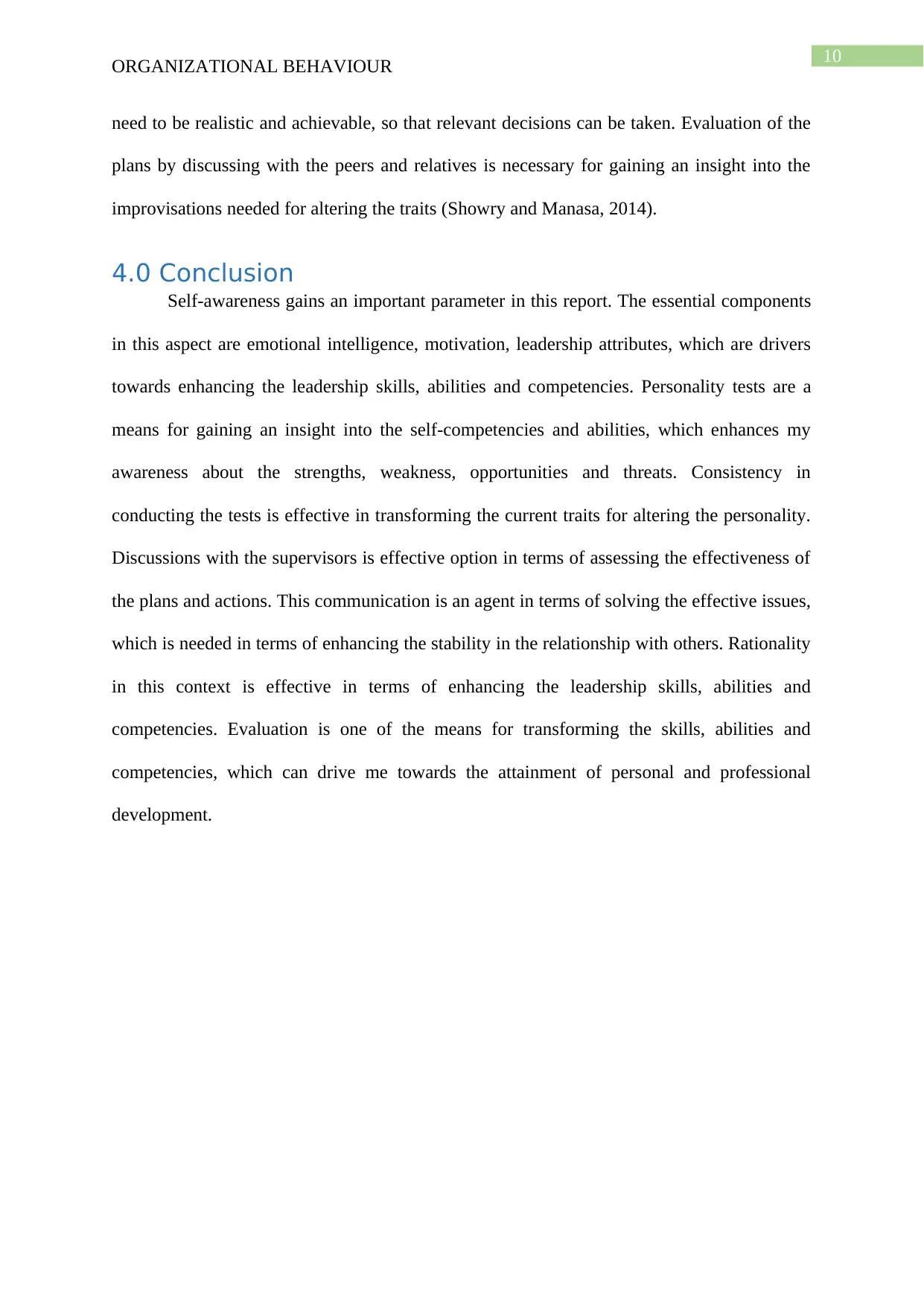
10
ORGANIZATIONAL BEHAVIOUR
need to be realistic and achievable, so that relevant decisions can be taken. Evaluation of the
plans by discussing with the peers and relatives is necessary for gaining an insight into the
improvisations needed for altering the traits (Showry and Manasa, 2014).
4.0 Conclusion
Self-awareness gains an important parameter in this report. The essential components
in this aspect are emotional intelligence, motivation, leadership attributes, which are drivers
towards enhancing the leadership skills, abilities and competencies. Personality tests are a
means for gaining an insight into the self-competencies and abilities, which enhances my
awareness about the strengths, weakness, opportunities and threats. Consistency in
conducting the tests is effective in transforming the current traits for altering the personality.
Discussions with the supervisors is effective option in terms of assessing the effectiveness of
the plans and actions. This communication is an agent in terms of solving the effective issues,
which is needed in terms of enhancing the stability in the relationship with others. Rationality
in this context is effective in terms of enhancing the leadership skills, abilities and
competencies. Evaluation is one of the means for transforming the skills, abilities and
competencies, which can drive me towards the attainment of personal and professional
development.
ORGANIZATIONAL BEHAVIOUR
need to be realistic and achievable, so that relevant decisions can be taken. Evaluation of the
plans by discussing with the peers and relatives is necessary for gaining an insight into the
improvisations needed for altering the traits (Showry and Manasa, 2014).
4.0 Conclusion
Self-awareness gains an important parameter in this report. The essential components
in this aspect are emotional intelligence, motivation, leadership attributes, which are drivers
towards enhancing the leadership skills, abilities and competencies. Personality tests are a
means for gaining an insight into the self-competencies and abilities, which enhances my
awareness about the strengths, weakness, opportunities and threats. Consistency in
conducting the tests is effective in transforming the current traits for altering the personality.
Discussions with the supervisors is effective option in terms of assessing the effectiveness of
the plans and actions. This communication is an agent in terms of solving the effective issues,
which is needed in terms of enhancing the stability in the relationship with others. Rationality
in this context is effective in terms of enhancing the leadership skills, abilities and
competencies. Evaluation is one of the means for transforming the skills, abilities and
competencies, which can drive me towards the attainment of personal and professional
development.
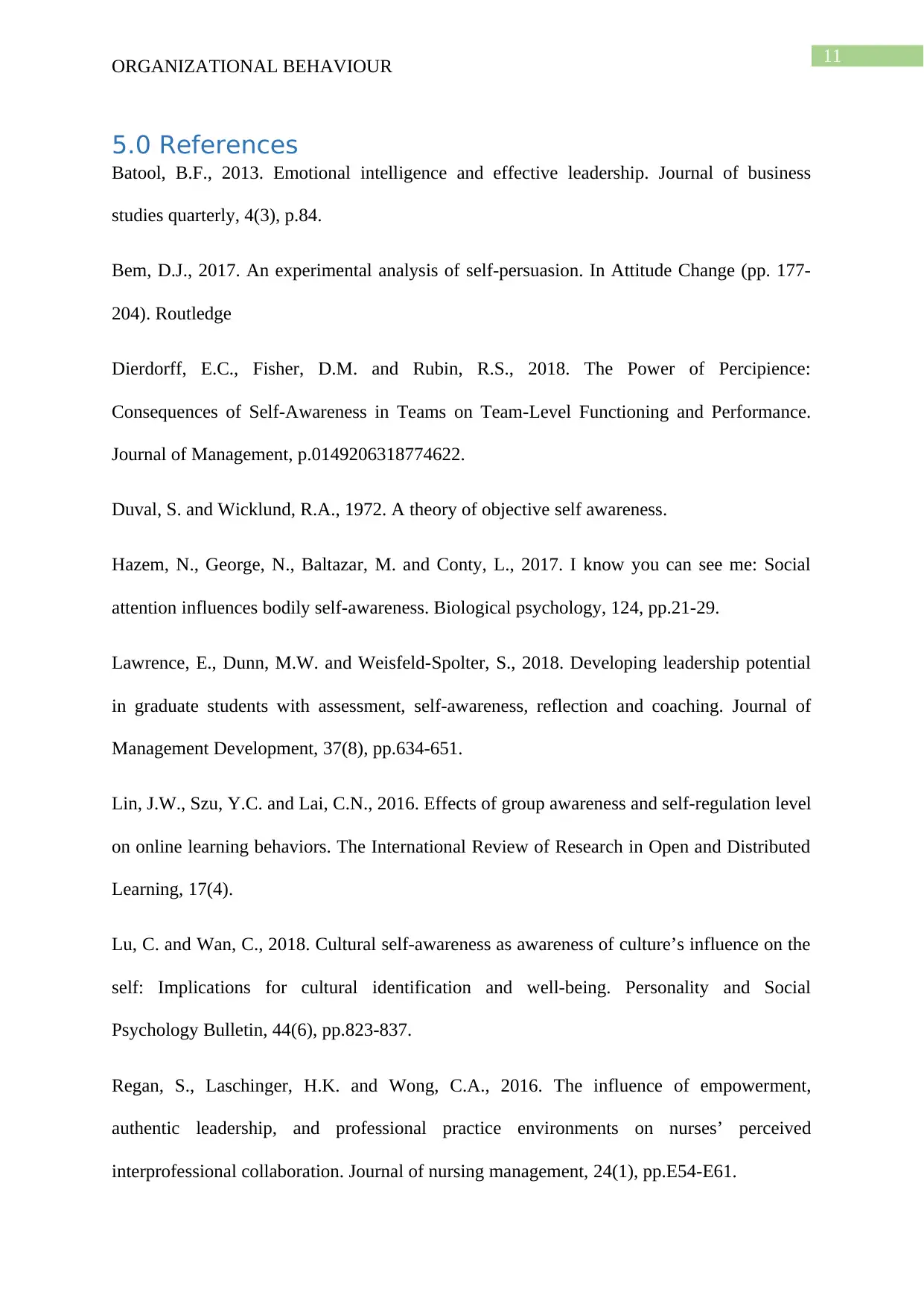
11
ORGANIZATIONAL BEHAVIOUR
5.0 References
Batool, B.F., 2013. Emotional intelligence and effective leadership. Journal of business
studies quarterly, 4(3), p.84.
Bem, D.J., 2017. An experimental analysis of self-persuasion. In Attitude Change (pp. 177-
204). Routledge
Dierdorff, E.C., Fisher, D.M. and Rubin, R.S., 2018. The Power of Percipience:
Consequences of Self-Awareness in Teams on Team-Level Functioning and Performance.
Journal of Management, p.0149206318774622.
Duval, S. and Wicklund, R.A., 1972. A theory of objective self awareness.
Hazem, N., George, N., Baltazar, M. and Conty, L., 2017. I know you can see me: Social
attention influences bodily self-awareness. Biological psychology, 124, pp.21-29.
Lawrence, E., Dunn, M.W. and Weisfeld-Spolter, S., 2018. Developing leadership potential
in graduate students with assessment, self-awareness, reflection and coaching. Journal of
Management Development, 37(8), pp.634-651.
Lin, J.W., Szu, Y.C. and Lai, C.N., 2016. Effects of group awareness and self-regulation level
on online learning behaviors. The International Review of Research in Open and Distributed
Learning, 17(4).
Lu, C. and Wan, C., 2018. Cultural self-awareness as awareness of culture’s influence on the
self: Implications for cultural identification and well-being. Personality and Social
Psychology Bulletin, 44(6), pp.823-837.
Regan, S., Laschinger, H.K. and Wong, C.A., 2016. The influence of empowerment,
authentic leadership, and professional practice environments on nurses’ perceived
interprofessional collaboration. Journal of nursing management, 24(1), pp.E54-E61.
ORGANIZATIONAL BEHAVIOUR
5.0 References
Batool, B.F., 2013. Emotional intelligence and effective leadership. Journal of business
studies quarterly, 4(3), p.84.
Bem, D.J., 2017. An experimental analysis of self-persuasion. In Attitude Change (pp. 177-
204). Routledge
Dierdorff, E.C., Fisher, D.M. and Rubin, R.S., 2018. The Power of Percipience:
Consequences of Self-Awareness in Teams on Team-Level Functioning and Performance.
Journal of Management, p.0149206318774622.
Duval, S. and Wicklund, R.A., 1972. A theory of objective self awareness.
Hazem, N., George, N., Baltazar, M. and Conty, L., 2017. I know you can see me: Social
attention influences bodily self-awareness. Biological psychology, 124, pp.21-29.
Lawrence, E., Dunn, M.W. and Weisfeld-Spolter, S., 2018. Developing leadership potential
in graduate students with assessment, self-awareness, reflection and coaching. Journal of
Management Development, 37(8), pp.634-651.
Lin, J.W., Szu, Y.C. and Lai, C.N., 2016. Effects of group awareness and self-regulation level
on online learning behaviors. The International Review of Research in Open and Distributed
Learning, 17(4).
Lu, C. and Wan, C., 2018. Cultural self-awareness as awareness of culture’s influence on the
self: Implications for cultural identification and well-being. Personality and Social
Psychology Bulletin, 44(6), pp.823-837.
Regan, S., Laschinger, H.K. and Wong, C.A., 2016. The influence of empowerment,
authentic leadership, and professional practice environments on nurses’ perceived
interprofessional collaboration. Journal of nursing management, 24(1), pp.E54-E61.
⊘ This is a preview!⊘
Do you want full access?
Subscribe today to unlock all pages.

Trusted by 1+ million students worldwide
1 out of 13
Related Documents
Your All-in-One AI-Powered Toolkit for Academic Success.
+13062052269
info@desklib.com
Available 24*7 on WhatsApp / Email
![[object Object]](/_next/static/media/star-bottom.7253800d.svg)
Unlock your academic potential
Copyright © 2020–2026 A2Z Services. All Rights Reserved. Developed and managed by ZUCOL.





